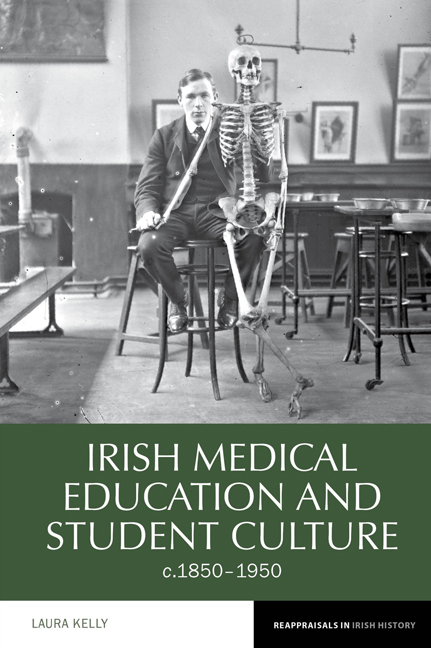Book contents
- Frontmatter
- Contents
- List of Figures
- List of Tables
- Acknowledgements
- List of Abbreviations
- Introduction
- 1 The Medical School Marketplace, c.1850–1900
- 2 ‘Entering upon an Honourable and Important Profession’: Irish Medical Student Image and Representation in the Age of Medical Reform, c.1850–1900
- 3 Beginnings: Medicine and Social Mobility, c.1850–1950
- 4 Educational Experiences and Medical Student Life, c.1880–1920
- 5 ‘Boys to Men’: Rites of Passage, Sport, Masculinity and Medical Student Culture, c.1880–1930
- 6 ‘This Feminine Invasion of Medicine’: Women in Irish Medical Schools, c.1880–1945
- 7 Medical Education and Student Culture North and South of the Border, c.1920–1950 200
- Conclusion
- Bibliography
- Index
4 - Educational Experiences and Medical Student Life, c.1880–1920
- Frontmatter
- Contents
- List of Figures
- List of Tables
- Acknowledgements
- List of Abbreviations
- Introduction
- 1 The Medical School Marketplace, c.1850–1900
- 2 ‘Entering upon an Honourable and Important Profession’: Irish Medical Student Image and Representation in the Age of Medical Reform, c.1850–1900
- 3 Beginnings: Medicine and Social Mobility, c.1850–1950
- 4 Educational Experiences and Medical Student Life, c.1880–1920
- 5 ‘Boys to Men’: Rites of Passage, Sport, Masculinity and Medical Student Culture, c.1880–1930
- 6 ‘This Feminine Invasion of Medicine’: Women in Irish Medical Schools, c.1880–1945
- 7 Medical Education and Student Culture North and South of the Border, c.1920–1950 200
- Conclusion
- Bibliography
- Index
Summary
By the early twentieth century, some professors at Irish medical schools were promoting a sense of confidence about the achievements of Irish medical education and its ‘scientific atmosphere’. This transition had not been straightforward. As has already been suggested, Irish medical education was beset with many problems for much of the nineteenth century. From the 1880s, attempts were made by the General Medical Council to standardise medical education in Britain and Ireland. In 1886, under the Medical Amendment Act, medical education was extended to a recommended five-year programme. The subjects taken remained the same as in earlier years, but a clear demarcation was made between the pre-clinical subjects and the clinical subjects. At Queen's College Galway in 1888, for instance, the medical curriculum was divided up into two periods, which were to take at least two years each. In the first period, students studied chemistry, practical chemistry, botany and zoology, anatomy and physiology, practical anatomy, comparative anatomy, practical physiology, materia medica and pharmacy. In the second period, they studied a second course of anatomy and physiology, a second course of practical anatomy, theory and practice of surgery, obstetrics and gynaecology, the theory and practice of medicine, state medicine (medical jurisprudence, hygiene, sanitary engineering) and pathology. The other Irish medical schools followed a similar programme.
By 1909, the National University of Ireland (NUI) suggested that students should spend five years in medical study and that the subjects of physics, chemistry, biology (including botany and zoology) should be taken in the first year, with the option of anatomy and practical anatomy and practical chemistry. For the second year, students were required to study the optional subjects from the first year, as well as physiology, materia medica and hospital attendance. They also had the option of taking practical physiology and histology. In the third year, students studied anatomy, practical anatomy, practical physiology and histology and materia medica (if not taken in the second year), as well as physiology, practical pharmacy, hospital attendance and two of the following: medicine, surgery and midwifery. In the fourth and fifth years, students studied medicine, surgery, midwifery (if not taken in the third year), operative surgery, medical jurisprudence, pathology, ophthalmology and otology, sanitary science, mental diseases, practical midwifery, as well as continuing their hospital attendance.
- Type
- Chapter
- Information
- Irish Medical Education and Student Culture, c.1850–1950 , pp. 104 - 136Publisher: Liverpool University PressPrint publication year: 2017



